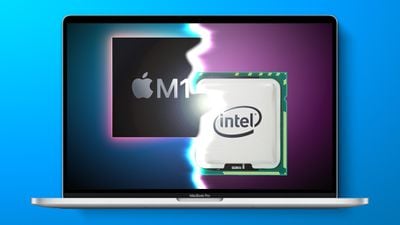Intel may see its market share fall to a new low next year, in large part thanks to Apple's decision to move away from using Intel processors in its Mac computers and instead use Apple silicon.

Apple announced last year that it would embark on a two-year-long journey to transition all of its Mac computers, both desktops, and laptops, to use its own in-house processors. Apple is expected to complete the transition next year and has so far only released four Macs with the first iteration of Apple silicon, M1.
As a result of the four Macs with M1 and upcoming releases, Intel this year will lose 50% of its orders from Apple, and eventually, losing all orders from the Cupertino tech giant will lead to Intel's market share falling below 80% in 2023, according to DigiTimes.
However, Apple's in-house developed Arm-based processor series is expected to play the key role in taking a major chunk from Intel's share in the upcoming year, the sources said.
Intel is expected to lose nearly 50% of its orders from Apple in 2021 and will eventually obtain no orders from the client. Losing Apple's 10% market share and seeing AMD staying firmly with another 10%, Intel's share in the notebook market is likely to slip below 80% in 2023, the sources noted.
Intel is seemingly aware of the impact that Apple silicon will have on its business as it has run multiple marketing campaigns against Macs, touting the view that laptops powered by Intel processors are superior compared to Apple silicon Macs. Bloomberg reported that Apple is testing high-end Apple silicon chips with as many as 32 high performance cores and 128 core options for graphics for future Mac releases.


















